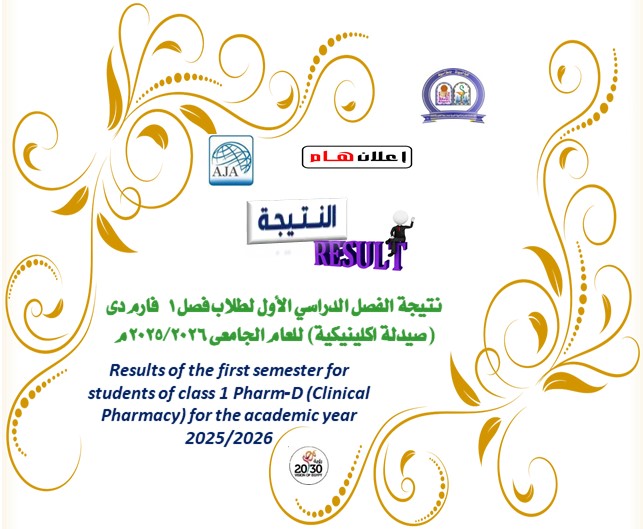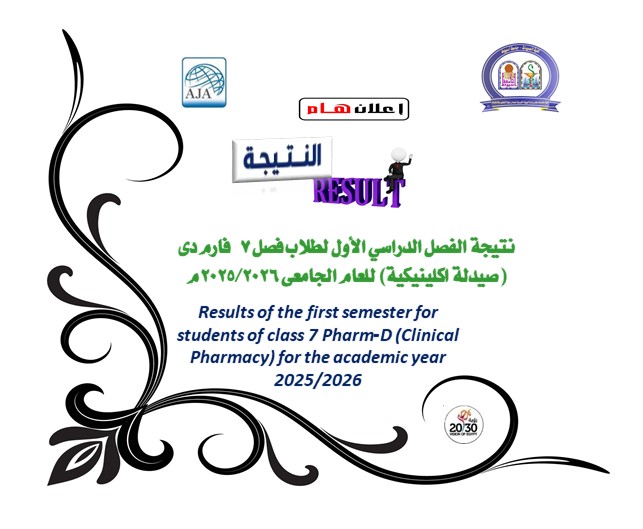Results for the first semester of the second year, Pharmacy program, academic year 2025/2026
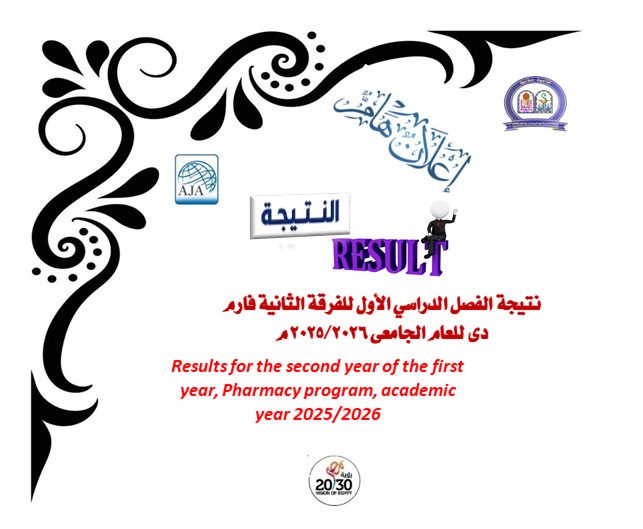

 Do you have any questions? (088) 2080369 - 2345622 Pharmacy_QAAU@pharm.aun.edu.eg
Do you have any questions? (088) 2080369 - 2345622 Pharmacy_QAAU@pharm.aun.edu.eg


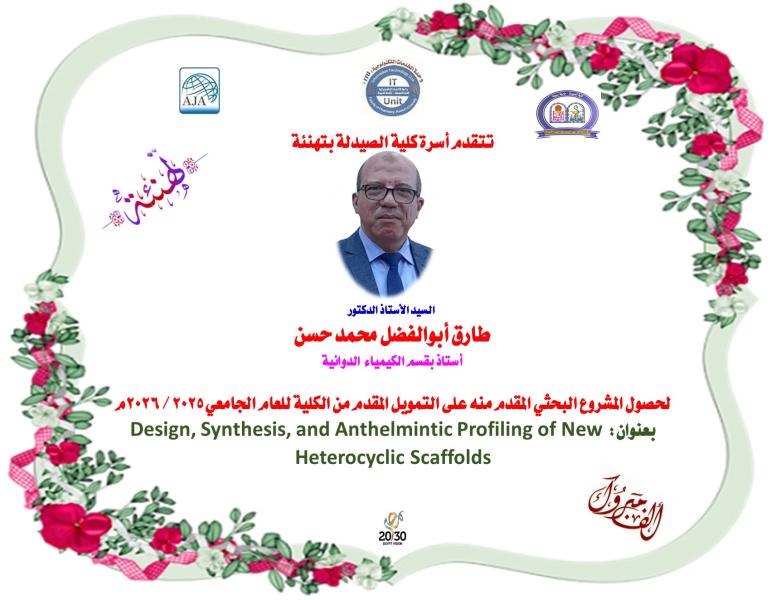
The Faculty extends its congratulations to
Professor Dr. Tarek Aboul-Fadl Mohamed Hassan,
Professor in the Department of Medicinal Chemistry, on receiving funding for his research project entitled: "Design, Synthesis, and Anthelmintic Profiling of New Heterocyclic Scaffolds" for the academic year 2025/2026.
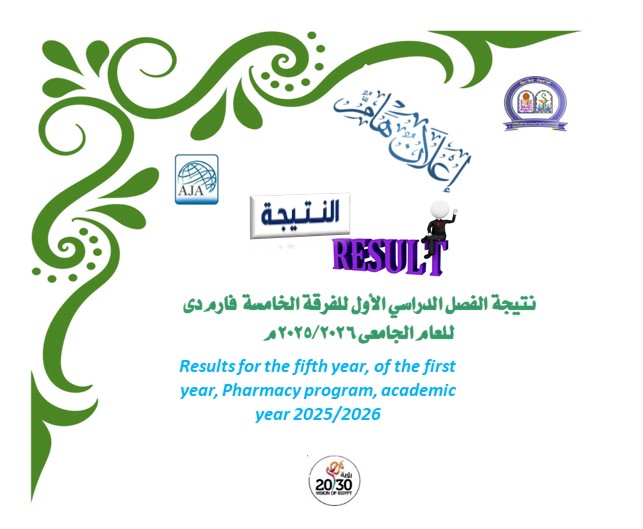
Inspired by the known anticancer activities of hydroxychalcones and acetamidochalcones, a series of novel hybrid molecules integrating these motifs with a paracetamol core were designed and synthesized. The synthesized chalcone–paracetamol hybrids were evaluated for their antiproliferative activity against a panel of eight human cancer cell lines. Compounds 6a, 6b, and 9, showed good activity against four cancer cell lines (U937, Jurkat, HCT-116 and MCF-7 cells). Notably, derivative 9 was the most potent with IC50 ranging from 1.50 to 4.50 μM, while showing no significant toxicity toward normal cells. Mechanistic investigations revealed that compound 9 induced cell cycle arrest at G0/G1 phase and stimulated apoptosis. Further biochemical analysis identified it (9) as a multi-target agent, with significant inhibitory activity against EGFR (0.62 ± 0.02 μM), VEGFR-2 (2.26 ± 0.01 μM), COX-2 (17.38 ± 0.13 μM), and tubulin polymerization (19.31 ± 0.29 μM). Molecular docking analysis supported these results, showing strong binding affinities for the respective target proteins, with high binding scores of compound 9 ranging from (−9.2 to −10.0) kcal/mol. Collectively, these findings highlight that compound 9 is worthy of further investigation as a potential anticancer lead.
CDK2 has emerged as a pivotal target in cancer chemotherapy. To develop a novel CDK2 inhibitor scaffold, multiple rational, structure-based design strategies were applied to known potent CDK2 inhibitors. Through retrosynthetic planning, chemical synthesis, and characterisation, compounds 2–8 were generated. Initial in vitro screening using the NCI-60 cancer cell line panel, followed by accurate cytotoxicity (GI50) measurements, shortlisted compounds 5, 8b, and 8d as promising candidates. These compounds exhibited GI50 values as low as 0.6 μM and demonstrated favourable safety profiles, with selectivity indices reaching up to 7.98. The top two active compounds, 5 and 8b, were further evaluated against the most sensitive cell line, MDA-MB-468 (breast cancer), at their respective GI50 concentrations. Flow cytometric cell cycle analysis revealed 82% and 78% G1 phase arrest for compounds 5 and 8b, respectively, suggesting an effective CDK2/cyclin E targeting mechanism. Furthermore, annexin V-FITC apoptosis assays showed robust pro-apoptotic effects, with total apoptosis induction elevated 34.5-fold and 32.4-fold over the negative control for compounds 5 and 8b, respectively. Subsequent CDK2/cyclin E1 enzymatic inhibition assays confirmed the potency of these compounds, with IC50 values of 3.92 nM for 5 and 0.77 nM for 8b, compared to 1.94 nM for the reference inhibitor roscovitine. Notably, the novel lead compound 8b exhibited approximately 2.5-fold greater potency than roscovitine. Molecular docking studies further supported the experimental findings and provided structural insights for future optimisation of this promising CDK2 inhibitor scaffold.
A general procedure was developed to synthesize and characterize some new 1,2,4-triazole, 3-cyanopyridine, 3-aminothienoquinoline and 5,6,7,8-tetrahydroisoquinoline derivatives bearing a 4-aminosalicylic acid ester moiety as substructure. Some of them were further modified to give new derivatives. This work allowed the preparation of 18 new compounds obtained in good yields and under simple experimental conditions. These compounds were evaluated for their antimicrobial activity against four strains of bacteria and two fungal species.
CD22 (also known as Siglec-2), an inhibitory receptor expressed in B lymphocytes (cells), recognizes the glycan structure α2,6-sialylated N-acetyllactosamine, and constitutively associates with various α2,6-sialylated membrane proteins expressed on the same cell (cis-ligands) although CD22 can bind to α2,6-sialylated molecules expressed in other cells (trans-ligands). The inhibitory activity of CD22 is regulated by the cis-ligands, and CD22 regulates B cells through the cis-ligands. Because of fast dissociation kinetics of the binding of CD22 with the ligands, systematic identification of CD22 ligands is not possible by conventional methods such as immunoprecipitation. Previously, we showed that proximity labeling using tyramide efficiently labels CD22-associated molecules. However, whether this association depends on the recognition of sialic acid by CD22 needs to be demonstrated to identify the cis-ligands. Here we develop the synthetic sialoside GSC-932 in which modification of the C5 position of the sialic acid core with a guanidyl group improves the affinity to mouse CD22 by 50 folds probably by generating the interaction of the guanidyl group with several amino acid residues in mouse CD22 such as E136 and R137, thereby efficiently inhibiting the binding of mouse CD22 with the α2,6-sialylated ligands. Application of GSC-932 to the proximity labeling clearly distinguishes sialic acid-dependent association with CD22 and shows that CD22 associates with a variety of cis-ligands. GSC-932 may be a useful tool to study ligand interaction of CD22.
